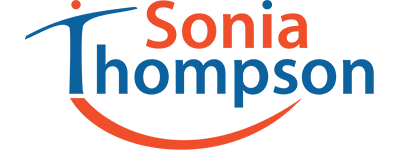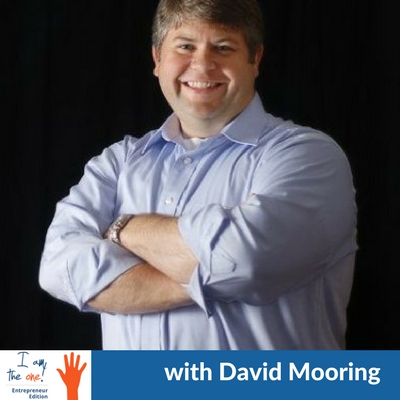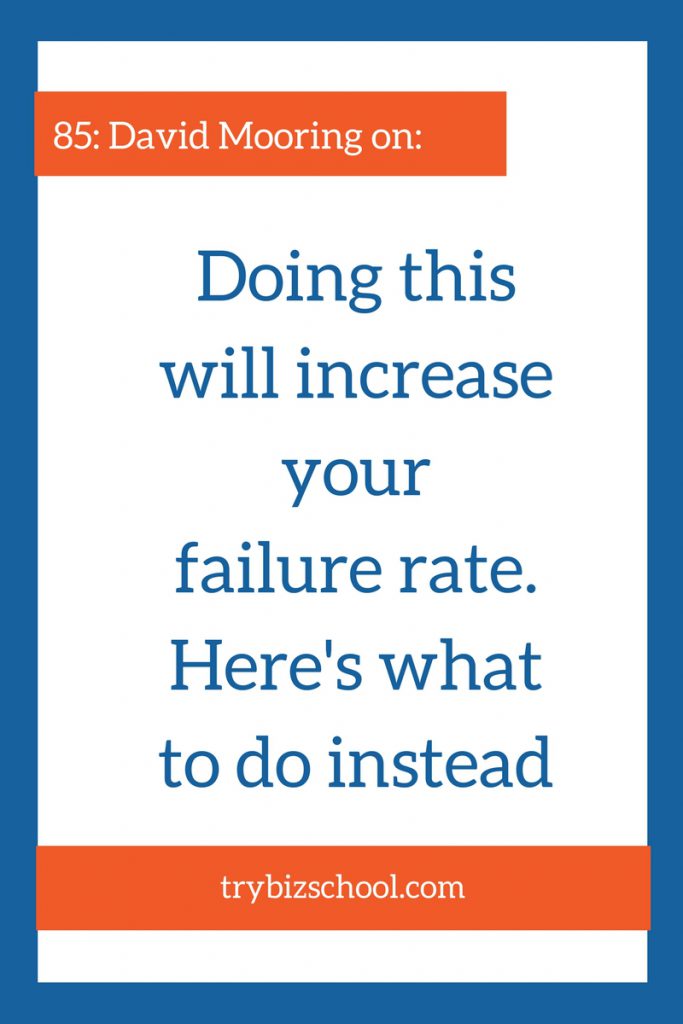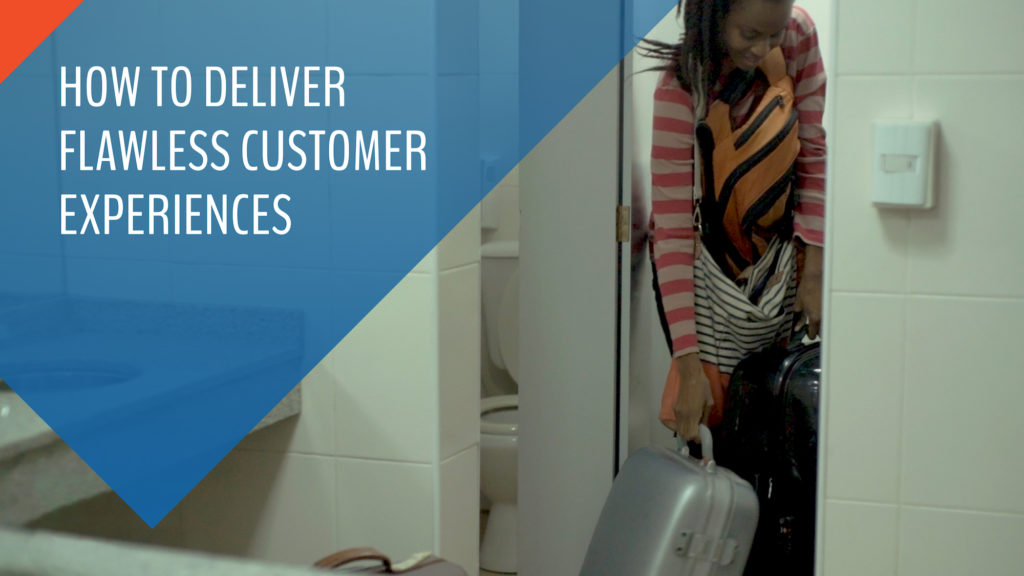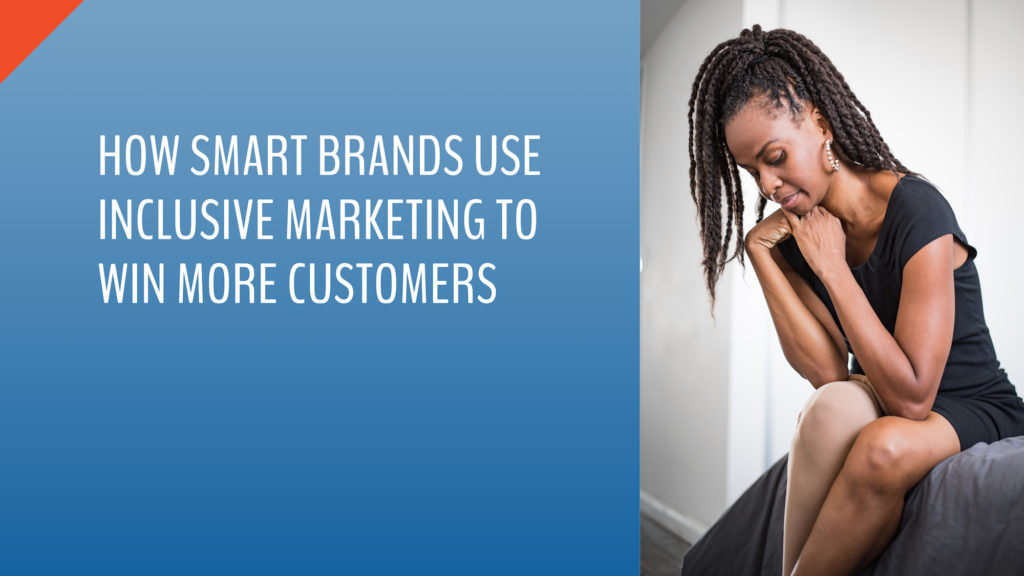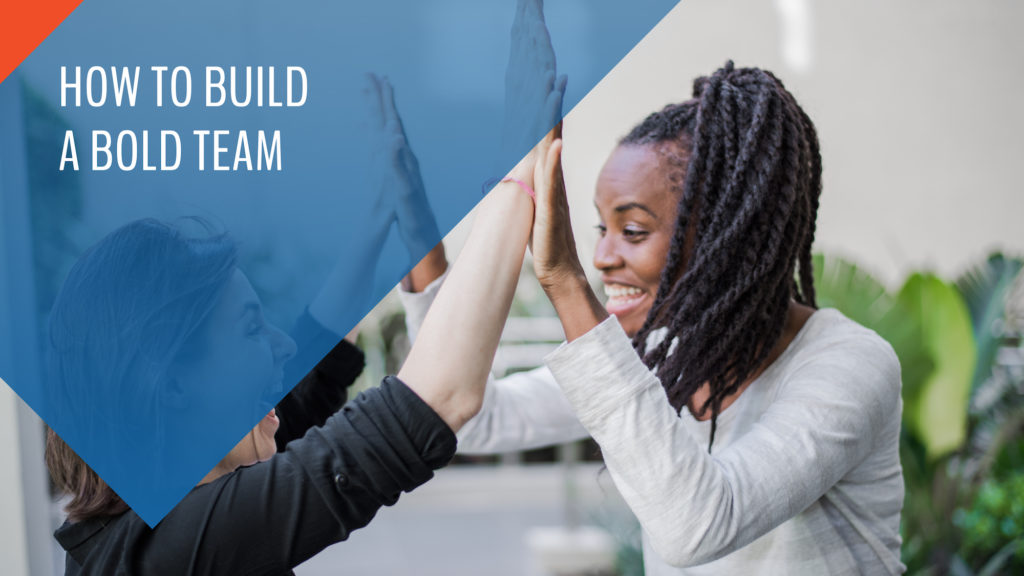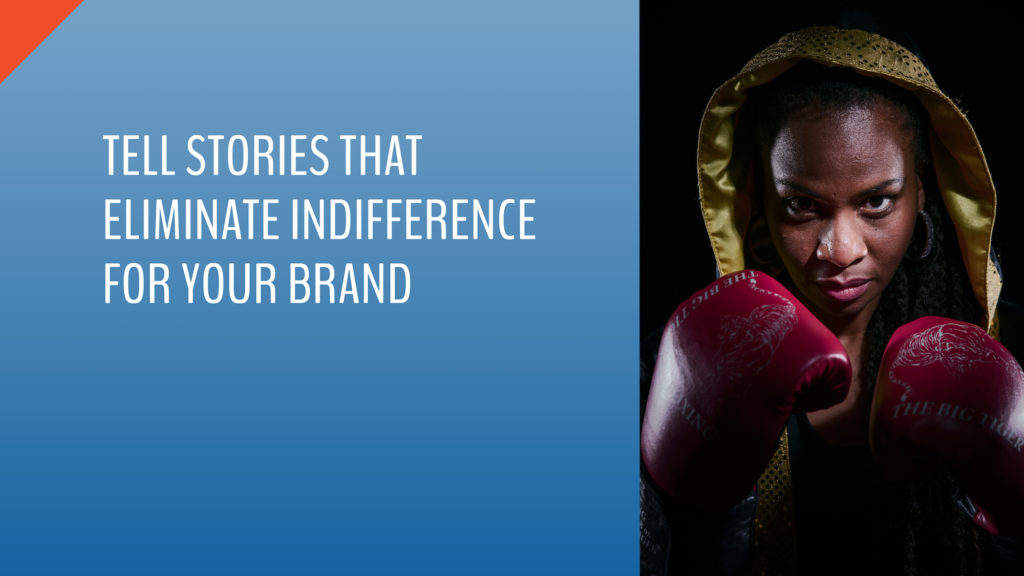David Mooring is the founder of SuperSimpl, where he helps people turn their knowledge into an online income stream.
He’s also the founder of BurlapSky, a digital marketing agency and consultancy.
We can learn a ton from Dave, in particular how he learned to figure out what the right path was for him to grow his business.
Key points:
- The key question you need to ask before getting your website designed
- The challenge with reverse engineering the success of others
- The right way to learn from others
- Why just “doing the work” isn’t enough to help you grow
- A simple way to uncover the root cause of your most pressing business problem
- How to find like-minded people to grow your business network
- How to prepare in advance to whether the hard times
Listen to the 27-minute episode here:
Show notes:
Interview transcript:
Sonia Thompson:
Hey David, thank you so much for joining me today, how are you?
Dave Mooring:
I’m doing very well Sonia, thank for having me on yor show. I look forward to talking to you.
Sonia:
Oh, it’s my pleasure. Let’s go ahead and dive right in. Tell me about your business, SuperSimpl.
David:
I am a marketing consultant. I’ve been in the digital space for about 11 years now.
Sonia:
That’s a long time!
David:
It is. Most of that has been in the agency world where I helped clients with their digital marketing, starting off in the web world, and moving more into marketing exclusively. SuperSimpl is somewhat of a side project that sort of started from being being invited to speak a lot.
SuperSimpl is somewhat of a side project that sort of started from being invited to speak a lot. I’ve been invited to teach a lot of workshops at colleges and universities and things like that, on marketing, because I’ve been in the space a long time and have had some good experience.
I realized one day that I just had a bunch of content that I’d been teaching in classes and in person. And I got kind of sick and tired of the rat race that we’re all in when we’re doing client work, and I thought well, there’s a lot of people doing a lot of cool things with online marketing and building online courses and workshops and teaching, and I’ve already got this content.
So SuperSimpl is a sb-brand of my company where I’m trying to take information from the content that I’ve been teaching in person, and putting that into more online content, while I still run daily operations of another businesses.
How to make digital marketing more manageable
Sonia:
Very good. Well tell me a bit more abot the specific problem that you solve for the people you serve.
David:
The biggest problem that I solve for people is that digital marketing is very overwhelming. And in doing this 11 years, at the beginning, most of the questions were just “how do I get a website?” Most people were just looking to get an online presence.
And then really rapid fire, really quickly, we got into social media, and email marketing has taken off. And now it has become extremely complex, and instead of being “oh, I need a website also,” it’s “I don’t even know what to do.”
Where I try to help people is, I like to work with people who are great at what they do, they just aren’t great at marketing that. I’ve worked with large companies, but I prefer smaller companies where the person who’s doing a lot of the marketing probably owns or runs the company.
And the problem they have is “how do I make the most of the time and the resources that I have?” Because most people can’t write a blog post every day, or some people can’t even write a blog post every week. And then to do the email marketing, and then the social media, and how am I going to be active, and how am I going to engage.
So I try to help them figure out, given the time and resources that you have, how can we add some tools to that, how can we simplify or automate some things, and how can yo do more with your marketing given the short amount of time that you have.
Sonia:
Very good. That’s a lot of stuff, and a lot of people need help with it. You mentioned a little bit of this whenever you first started talking, but why did you decide that you were going to be the one to solve this problem for them?
David:
From 2005 to 2010 I was VP of a custom website development company, so we did a lot of custom websites and mobile applications for a lot of big name companies. When I left there, I decided to start my own firm, which is called Burlap Sky.
And when I was surveying the land, I realized that there’s a lot of creatives that approach everything from a “you need a brand and logo and all the creative.” And there’s a lot of developers that are doing things on the back end as far as custom apps and things like that.
I didn’t really see anybody solving the business problem of “here’s my business, I just need more customers, or I just want to streamline what I’m doing, or I just want to increase profitability. Maybe I don’t need a website. Or maybe I don’t need a logo. Maybe I don’t need an app. Just how do I get to that?”
And I didn’t see anybody doing that. And I love research and digging down into figuring out what is the super simple or short path that you can take to get there.
Sonia:
Right, and I think that’s a common problem. A lot of entrepreneurs, who don’t necessarily have a business background, they will see the tangible things like a website, a logo, and they think once they have it and it looks great, that all the other things will come. But like you said, there’s the business problem of how you actually feed that funnel.
David:
Yeah. So many people wold come up and just say “I need a website.” And then I would ask them, “how are you getting your customers?”
“Referrals.”
Then I’d ask, “what are they doing when they come to your website?”
“Nothing.”
Well let’s get some email marketing in place so you can get your referrals on a list, and get some emails from people who come to your website before you redesign the entire website. Let’s take what you’ve already got and figure it out from there.
The right and wrong ways to use the stories of successful entrepreneurs
Sonia:
Absolutely. So let’s switch gears a little bit and talk more about your experiences as an entrepreneur.
David:
Sure.
Sonia:
So what would you say was the biggest barrier in mindset that you had that limited your success, and how did you overcome it?
David:
That’s a great question by the way. I think the hardest thing that I ran into was kind of believing this lie that you have to follow what everyone else is doing, that you look at the successful people, and somehow magically recreate what they did.
If it’s someone that built a 7 or 8-figure business, yo can backtrack and dissect what they did, and if yo do that, you’ll get there. Or you can see someone that’s doing a great job on Twitter, and yo can mimic them, and yo fail to realize, or I failed to realize that my personality is different. How I tackle problems is different. How I communicate with people is different.
So I can’t be those people. But for a long time, I just tried to mimic to see if I could replicate their success and I couldn’t. That was a huge hurdle to overcome.
Sonia:
Was there something in particular that happened that made yo say, you know what, screw this, I’m going to try a different way?
David:
I don’t think there was any one moment. I just think it was, in the early days I would spend a lot of time on Twitter, and I just wouldn’t see the traction that I wanted. Or I would spend a lot of time going to networking events. You know just doing whatever I thought other people were doing, and over and over again I just realized, it’s just not working for me. I need to do something different. I need to be me, and figure out what is the best that I can offer and how do I go about achieving what I want.
Sonia:
Now how did you find that path for you, because I think a lot of times people experience that same challenge that you had, but they aren’t just really sure what their thing is.
David:
A lot of it is reading. I do a lot of reading, and I listen to podcasts. Listening to sccess stories. I’m a big fan of Tim Ferris, and I’ve followed him since probably around 2008. And I really like the way he approaches this, as looking at what have some other people done, what is the thing that I can take away from them, and how can I apply that to my business.
So I would just say surrounding yourself with information and other people, regardless of whether they are in person or you’re listening to people. Surrounding yourself with people that are saying it’s ok to be different. It’s ok to do your own thing. I love reading entrepreneurial success stories, where people just went against the grain, and they just knew that there was something wrong with whatever industry they were in. And something just told them just to go ahead and do it.
I was just listening to the founder of Boll and Branch, the bedding company if you’re not familiar with them, look them up. But there was an interview by an entrepreneur named Mike Dillard, and it was just a great story of someone getting into an industry because he saw that it was broken, and so he said, “I’ve got to fix this” and so he kind of went back and reengineered the entire process of producing a product. That type of stuff of getting around those types of people, even if you’re just listening to them.
How to leverage your past (sometimes unrelated) experiences in your business
Sonia:
Yeah, it does help. It does help tremendously. What would yo say is your superpower?
David:
Yeah, I saw that whenever you sent over the questions. I would say my super power is I understand people, and I understand multiple points of view. I’m able to put myself in someone else’s shoes, and kind of see where they’ve been or maybe some issues they’ve been dealing with because they have a mental barrier, or maybe they have a certain way of thinking that they need to overcome. Or maybe I can see that they are trying to mimic another company.
So understanding where people are coming from. And then, I have a really good knack for combining things that seem very different, or disparate types. I’ve worked in probably 30 different businesses. I’ve had multiple jobs. Because I like to solve problems, and typically, once I solve a problem or figure how things work out, I get a little bit bored with it.
So early on I had a lot of different jobs, just because I couldn’t find anything that kept my attention. But, in having all those different jobs, I’m able to connect all those different pieces and see how management structure might work in the rental car business, and management working in fast food, and how to bring that into a web development company.
And those are all very different, but there’s something, a thread through them that I’m able to pick up on and run with.
Sonia:
That’s always helpful. What would yo say, do yo have habits or any suite of habits that yo use to help yo be as efficient and effective as yo can be in managing your business?
David:
As far as being effective and efficient…
Sonia:
Or just to help yo get through the day.
David:
Well that’s a good question. I think reading and focusing on improving myself constantly. I think early on in my career I thought that just doing the work would help you improve, but then I realized that you can do the same job over and over again and not get any better if you don’t make any concerted efforts to improve, so I read a lot.
So I start off every morning and I read a little bit out of the Bible, which is really grounding for me. Especially out of Proverbs and some things with a lot of wisdom. Because being an entrepreneur is very difficult, raising a family is very difficult. Balancing all these different things.
I’ve got a really big vision. I’m trying to do really big things, and it takes years and years to get there. And you can get down on yourself, you can get discouraged, so having some routines of here are some things that I do every single day, and really looking outside of myself I would say helps.
Sonia:
It makes a big difference. I have to do the same thing too to sort of get out of your own head and refocus on
David:
Yeah, something bigger. Something further down the road.
How to give your customers what they really want (even if they don’t know themselves)
Sonia:
Absolutely. How do you stay in tune to the needs of your customer? I know you mentioned that you were seeing a lot of them, they were coming to you with a specific problem, but what they actually needed was something deeper.
How do you tune into what it is they actually need so you can deliver it to them? Because sometimes it’s different from what you are asking them for.
David:
Sure. I ask a lot of questions, like what’s the question behind the question. So if I’m working with a client, or even working with a group of people, on the surface, it looks like you might have one problem like you’re just not getting the phone to ring, or you’re just not getting clients or your just not getting emails, things like that.
And I try to look, what’s the question that you’re not asking. What is the question behind the question. Just ask why 2 or 3 times. And you usually start uncovering deeper issues, or assumptions that people have that they need to correct.
A good example of that is I was working with a large accounting firm that wasn’t doing a whole lot with their email address. And they thought, well most of our clients come through referrals, we don’t need a large email marketing campaign.
But just to dig a little bit deeper, I helped them uncover what happens when someone makes a referral is that they typically go to your website to check it out, well if they don’t call you, how are you going to keep in touch with them.
Just continuing with what happens with this, and what happens with that, and why do you think that and what happens if you went a different way. So I think just asking a lot of really good questions, really helps to get behind those things, and really understand the client. And maybe they haven’t even thought about some things because they don’t ask themselves those questions. They make a lot of assumptions.
How to free up the time to do your most important work
Sonia:
That’s true. That’s true.
Alright, so speaking of relationships, not the client relationships that you have, but on a scale of 1-10, what would you rate yourself in terms of the importance that you place on relationships separate from your client ones, to build and grow your business?
David:
The importance is a 10. I’ve had periods of time when I thought, well I just can’t find the right people, so I’m just going to do it all myself. And inevitably, you get tied up doing a lot of things that you shouldn’t be doing. And you find yourself spending way too much time doing bookkeeping, or way too much time doing account management, or a lot of things that are not growing your business or not operating in your strengths.
But it’s very difficult when, for example, I’m trying to do something new, and I don’t have a large team, to really put the pieces in place and really figure out what am I not going to do, what am I going to do.
One of the first people I hired was a bookkeeper, just to take off some of the keeping up with receipts and mileage, and those types of things. I think one of the things I didn’t do very well was hire a VA sooner.
I’ve got a really great VA, we’ve been working together for about a year now, she’s a great fit, and I wish I had hired her 3 years ago. Those types of things.
Having the right team is very important, and just being able to let go of some things you shouldn’t be doing is critical, but it’s not easy at all.
Sonia:
It’s not. It’s not. Aside from the people that do work for you, do you do any other nurturing of relationships maybe with other peers or anyone else? Or is it more so to just get the work done?
David:
That’s a great question. I’ve got a buddy of mine, who is in a different industry. He’s a writer in game development. We get together on a regular basis. I like to be part of various groups and meetups and go to conferences and things like that where we met at a conference, at the Digital Commerce Summit.
And then I got into podcasting about eighteen months ago, and worked with 2 other people here in central North Carolina to start a podcasting meetup. So we have a meetup once a month, that’s actually going to be tonight, where we get together with podcasters and other like-minded people.
I really believe networking, and building mastermind type groups, even if it’s just one or two other people is really important to helping stay on the right track.
Sonia:
Definitely, because it can be a lonely road.
David:
It really can. I mean over the past couple of years as I’ve been trying to get out of client work so I can spend more time at home and with my family, I probably spend 4 days a week just by myself for the entire day. So having something to look forward to once a week or once a month is really good.
And I try to get meetings, and I try to grab lunch with people once a week. But yeah, it’s important to stay connected to people.
David’s 3 keys to being a successful entreprener
Sonia:
For sure. Now what would you say from all the experiences that you’ve had would be your 3 keys to success?
David:
By the way, you’ve got some really great questions. I really enjoyed your questions, they made me think.
Sonia:
Thank you!
David:
As I mentioned before, reading and learning is critical. And even some of the entrepreneurs that I look up to and aspire to be like or see what they’ve done, they all talk about reading a whole lot. Reading and learning, whether its listening to audiobooks or things like that are really important.
I’m a big fan of Seth Godin.
Sonia:
Me too, me too!
David:
Yeah, and his short book The Dip really stuck with me. Have you read The Dip?
Sonia:
I have.
David:
It’s really good to put things into perspective. I think a lot of entrepreneurs have the question and I’ve asked myself this, how do I know when to quit?
Sonia:
Ok.
David:
And we don’t do a very good job of answering that for ourselves. But I think if you put something into context, like thinking about the dip, is there’s going to be hard times, and don’t quit during the hard times, but know when they are going to be ahead of time. It’s important.
So I think understanding how long, it’s not going to be an overnight success, it’s going to take a long time. And being prepared for those hard times is really important.
And then the last one is, I think it’s key to find what your competitive advantage is. What can you do, especially if you’re a solopreneur, or have a really small business, is what can you do that no one else can do?
What problems can you solve? What experiences have you had? Or how do you work with people or how do you understand things? What is it that there’s just nobody else, because we’re all different, we’re all unique. What is it that you do different that nobody else can do and how do you incorporate that into your business?
Because again, I messed up by trying to do things like other people, and I see a lot of small business owners and entrepreneurs are scared to fail. So they tend to do what other people have done in their industry, because they see some people having success or not failing.
So if they take a risk and they fail, then they’ll feel miserable for it, so they are scared to fail. They ultimately just try to copy what everyone else is doing, which I think actually increases the failure rate. Because what you don’t know is if the other company is really successful. So they may be growing, but they may be hemmoraging money, and maybe at a point of closing in the next 6 months.
So you don’t know what’s working, you just assume. You make a lot of assumptions.
Sonia:
Yeah. And a lot of times, I think it’s good to follow a framework or proven process, but like put your own stuff in it. But a lot of times, you can’t just blindly copy something because you could be copying somebody’s strategy that is in a completely different stage than you, so it works for them, and it could be a great blueprint, but you’re at a different place than they are, so it doesn’t work for you.
David:
That’s a great point. Especially if you look at people who are doing what you’re doing and they are 5 years ahead of you. Well they might have a team of 6 people doing that and you’re one person and a part time VA. You can’t do what they’re doing. You might try and you’re going to burn out, so that’s a good point.
Sonia:
One other quick question, you mentioned that your first hire was a bookkeeper, and you wish you would have hired your VA sooner. If you had to go back and do it again, would your hires have been the same and in the same order, just earlier?
David:
Probably.
Sonia:
Ok.
David:
I’m more creative than I am…I don’t do great with the numbers and keeping track of all those types of things, so I think having the bookkeeper early was still a good thing for me. Because what she can do in Quickbooks in 30 minutes would take me 2 or 3 hours. It’s just not easy for me, it’s not intuitive.
And then hiring the VA, I think I probably would have, because in 2010 I started a digital marketing firm, which then morphed into more of a consultancy. But I think early on when I was building a lot of websites and doing a lot of web projects, I think a VA would have helped me take some of the things off my plate that I spent a lot of time doing.
So there were a couple of years where my revenue numbers were really really good, but my profit was not near what I thought it would be. It was because I wasn’t managing my time well, I wasn’t managing my contractors well, and I was just spending way too much money and too much time not maximizing the business. I was just getting stuff done.
Sonia:
Got it. That’s a good point. This has been great. I’ve enjoyed our conversation tremendously. What can we expect to see from you in the future? Where can people find you so they can stay abreast of all that’s going on with you?
David:
The best place to find me is at SuperSimpl.com, and just drop the last “e” on Super Simple. That’s really where I’m trying to move forward. I still do a lot of coaching and consulting, but I’m trying to move into more of the digital space.
What’s coming up is I’m trying to pivot a bit more into a membership site, where I have a community set up. With my ultimate goal, which I’m making a little bit of a change right now is instead of just helping people with marketing, I’m more passionate about helping people with small businesses, or microbusinesses.
Because I see a lot of people, including my VA, one of her things is she wants to be at home with her children more, and she’s got a special needs child, and we’re doing a couple of projects together.
But I’m real passionate about helping people build, what a buddy of mine Nick Loper would call a side hustle, or Tim Ferriss calls a muse, or some sort of side business or small business that generates revenue over a longer period of time, so people could have a little bit more freedom to be with their families or to do what they’re called to do, or to go on a missions trip, or to help with a community project and things like that.
So I’m going to be shifting that way, and that’s what’s coming up for me is to really help, go beyond marketing and into small businesses.
Sonia:
Sounds awesome, and super needed. So I’m so glad you’re doing that. I’ll have all your contact information in the show notes so people can find you easily.
David:
Great, I appreciate it.
Sonia:
Before I let you go, I do have one other question to dig inside your head a bit more, and that’s to deliver a line from a movie that speaks to you and explain why you chose that one.
David:
So the line that comes to mind, and it’s been coming to my mind a lot is I’m a big fan of the Rocky movies, and the Rocky series, and there’s a line, I’ve heard it a lot recently, but it’s in Rocky Balboa, the one that came out a couple of years ago. He’s having a conversation with his son, and he’s just talking about how hard life is, and it’s “It ain’t about how hard you can hit, it’s about how hard you can get hit and keep moving forward.”
And I think as an entrepreneur, and I’m married and I’ve got 2 kids, and I’m trying to balance life, it can get really hard, it can get really difficult.
You lose a client, or something doesn’t go well, or maybe you launch a product and sales weren’t what you wanted it to be or something crashes. You’re going to run into a lot of obstacles, you’re going to get hit a lot of times.
So just be prepared to get back up on your feet and keep moving forward.
Sonia:
Great lesson, because you’re going to get hit. You’re going to get knocked down.
David:
It’s gonna happen.
Sonia:
It’s gonna happen. David this has been so much fun. Thank you again for stopping by and sharing your experiences and learnings with us.
David:
Thank you Sonia, it was so great to meet you, and I’m really glad we had this conversation, it’s been really fun. I really appreciate you having me on.
Sonia:
My pleasure.
Free Mini-Course: The Blueprint for Building a Thriving Business
Free Mini-Course: The Blueprint for Building a Thriving Business
Learn where to direct your energy so you can win more customers, grow your business, and enjoy more freedom
- Framework based upon in the trenches experiences from 100+ successful entrepreneurs, including several who’ve built multi-million dollar businesses
- Science-based explanations to support why the blueprint works
- Action items to help you get some quick wins
